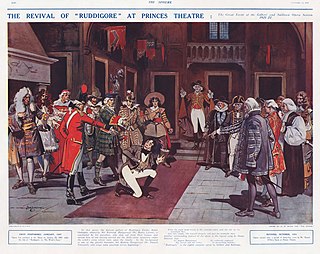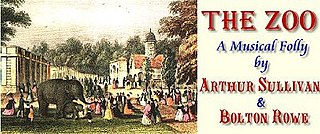
Gilbert and Sullivan was a Victorian-era theatrical partnership of the dramatist W. S. Gilbert (1836–1911) and the composer Arthur Sullivan (1842–1900), who jointly created fourteen comic operas between 1871 and 1896, of which H.M.S. Pinafore, The Pirates of Penzance and The Mikado are among the best known.

Sir Arthur Seymour Sullivan was an English composer. He is best known for 14 operatic collaborations with the dramatist W. S. Gilbert, including H.M.S. Pinafore, The Pirates of Penzance and The Mikado. His works include 24 operas, 11 major orchestral works, ten choral works and oratorios, two ballets, incidental music to several plays, and numerous church pieces, songs, and piano and chamber pieces. His hymns and songs include "Onward, Christian Soldiers" and "The Lost Chord".

The Mikado; or, The Town of Titipu is a comic opera in two acts, with music by Arthur Sullivan and libretto by W. S. Gilbert, their ninth of fourteen operatic collaborations. It opened on 14 March 1885, in London, where it ran at the Savoy Theatre for 672 performances, the second-longest run for any work of musical theatre and one of the longest runs of any theatre piece up to that time. By the end of 1885, it was estimated that, in Europe and America, at least 150 companies were producing the opera.

Ruddigore; or, The Witch's Curse, originally called Ruddygore, is a comic opera in two acts, with music by Arthur Sullivan and libretto by W. S. Gilbert. It is one of the Savoy Operas and the tenth of fourteen comic operas written together by Gilbert and Sullivan. It was first performed by the D'Oyly Carte Opera Company at the Savoy Theatre in London on 22 January 1887.

Savoy opera was a style of comic opera that developed in Victorian England in the late 19th century, with W. S. Gilbert and Arthur Sullivan as the original and most successful practitioners. The name is derived from the Savoy Theatre, which impresario Richard D'Oyly Carte built to house the Gilbert and Sullivan pieces, and later those by other composer–librettist teams. The great bulk of the non-G&S Savoy Operas either failed to achieve a foothold in the standard repertory, or have faded over the years, leaving the term "Savoy Opera" as practically synonymous with Gilbert and Sullivan. The Savoy operas were seminal influences on the creation of the modern musical.

Alfred Cellier was an English composer, orchestrator and conductor.

The D'Oyly Carte Opera Company is a professional British light opera company which, from the 1870s until 1982, staged Gilbert and Sullivan's Savoy operas nearly year-round in the UK and sometimes toured in Europe, North America and elsewhere. The company was revived for short seasons and tours from 1988 to 2003, and since 2013 it has co-produced four of the operas with Scottish Opera.

The Zoo is a one-act comic opera, with music by Arthur Sullivan and a libretto by B. C. Stephenson, writing under the pen name of Bolton Rowe. It premiered on 5 June 1875 at the St. James's Theatre in London, concluding its run five weeks later, on 10 July 1875, at the Haymarket Theatre. There were brief revivals in late 1875, and again in 1879, before the opera was shelved.

Rosina Brandram was an English opera singer and actress primarily known for creating many of the contralto roles in the Savoy operas with the D'Oyly Carte Opera Company.

Charles Courtice Pounds, better known by the stage name Courtice Pounds, was an English singer and actor known for his performances in the tenor roles of the Savoy Operas with the D'Oyly Carte Opera Company and his later roles in Shakespeare plays and Edwardian musical comedies.

Fred Billington was an English singer and actor, best known for his performances in baritone roles of the Savoy Operas with the D'Oyly Carte Opera Company. His career with the company began in 1879 and continued with brief interruptions until his death in 1917.

After All! is a one-act comic opera with a libretto by Frank Desprez and music by Alfred Cellier. It was first performed at the Savoy Theatre under the management of Richard D'Oyly Carte, along with H.M.S. Pinafore and another short piece, Cups and Saucers, from December 1878 to February 1880.

François Arsène Cellier, often called Frank, was an English conductor and composer. He is known for his tenure as musical director and conductor of the D'Oyly Carte Opera Company during the original runs and early revivals of the Savoy operas.

The Spectre Knight is a one-act "fanciful operetta" with a libretto by James Albery and music by Alfred Cellier. It was first performed on 9 February 1878 at the Opera Comique by the Comedy Opera Company as a companion piece to The Sorcerer. The piece continued to run until 23 March 1878 and was revived by the company from 28 May 1878 to 10 August 1878 as a companion piece to H.M.S. Pinafore. The piece had a run in New York in 1880 and was toured in Britain and America.

A Private Wire is a one-act musical "vaudeville" operetta with a libretto by Frank Desprez and Arnold Felix and music by Percy Reeve. It was first produced at the Savoy Theatre on 31 March 1883 to 1 January 1884 as a companion piece to Gilbert and Sullivan's Iolanthe. The piece also toured from March to July 1884.
Weather or No is a one-act comic opera, styled a "musical duologue", by Bertram Luard-Selby with a libretto by Adrian Ross and William Beach. It was produced at the Savoy Theatre from 10 August 1896 to 17 February 1897 as a companion piece to The Mikado, and from 2 March 1897 to 24 April 1897 with His Majesty, for a total of 209 performances.
A Welsh Sunset is a one-act comic opera composed by Philip Michael Faraday, with a libretto by Frederick Fenn. It was produced at the Savoy Theatre from 15 July 1908 and played with revivals of H.M.S. Pinafore and The Pirates of Penzance until 17 October 1908, and from 2 December 1908 until 24 February 1909, a total of 85 performances. A copy of the vocal score, but no printed libretto, is found in the British Library. The score contains all the dialogue.
P. W. Halton, was an Irish-born conductor. He is best known for his long tenure as music director and conductor of D'Oyly Carte Opera Company touring companies during the original runs and early revivals of the Savoy Operas, including many of the New York premieres.

James Hamilton Siree Clarke, better known as Hamilton Clarke, was an English conductor, composer and organist. Although Clarke was a prolific composer, he is best remembered as an associate of Arthur Sullivan, for whom he arranged music and compiled overtures for some of the Savoy Operas, including Gilbert and Sullivan's The Mikado.
The Outpost is an opera or operetta by the composer Hamilton Clarke with a libretto by A. O'D. Bartholeyns. The story is an adaptation of the Singspiel Der vierjährige Posten by Theodor Körner with music by Franz Schubert.















